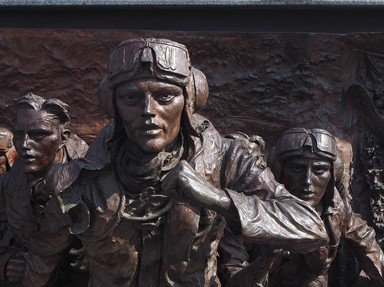Quiz Answer Key and Fun Facts
1. The Blitz started a year later than expected. After Neville Chamberlain declared war on Germany on September 3rd 1939, the air raid sirens of London began blaring out the sound that would later haunt the people of London. Many people expected the bombs to fall once Chamberlain made his announcement, but to many people's surprise the bombs did not arrive and soon people began to believe that the whole war was not as it seemed. What term did people call the war in this period of virtual inactivity ?
2. Berlin was bombed for twelve nights by RAF bombers starting on August 25th 1940. Hitler realised that Fighter Command had not been defeated during the ensuing Battle of Britain, so action had to be taken. German bomber crews were suffering heavy losses and were becoming tired and dispirited, so Hitler needed to find an answer to the problem, attack the "forbidden target". What was this "forbidden target"?
3. 4pm on Saturday, September 7th saw the beginning of the massive aerial attack that was to plague London for weeks. 320 bombers, protected by 600 fighters made their way in formation over the Kent coast. Field Marshal Kesselring had put in the air everything he had at his disposal. He sent out five types of plane, the Heinkel He-111, the slow but dependable Dornier Do-17s which were escorted by long range Messerschmitt Bf-110s and the single seater Bf-109 fighter, but what faster type of plane made a massive difference to the speed and bomb capacity of the Luftwaffe attack?
4. On 7 September 1940 the RAF made its first major error in the war. London had been accidental bombed by the Luftwaffe, which had been concentrating fully on the airfields and coastal defences. Radar had picked up the massive aerial armada coming in from the Channel, but Fighter Command responded by placing its aircraft away from London as it was assumed the target was coastal defences. This error gave the Luftwaffe a clear run in daylight up the Thames towards the London docklands. The loads were dropped and the RAF Spitfires and Hurricanes were too far away to lead any kind of response. Which docks in London had been ordered by Luftwaffe Command to be destroyed first and foremost?
5. The daylight bombing of September 7th 1940 was never repeated on the same scale. Fighter Command made sure its defences prevented any Luftwaffe day time attacks. During the hours of bombing that day, over 300 tons of high explosives and thousands of incendiaries had fallen. London was burning, and that evening 247 bombers returned. On the morning of September 8th, over 500 Londoners had been killed and nearly 1400 seriously injured. But when did the "Blitz" officially end?
6. Was the decision to use deep-level London Underground stations for shelter taken by the government within 48 hours of the attack of 7 September 1940?
7. Churchill saw that the RAF had very little to counter the night time bombings with. He had no aircraft specifically equipped to deal with night raids, although a number of Blenheims did eventually provide some relief.
In General Sir Frederick Pile they had a man who gave London more belief. Sir Pile had 92 'Ack Acks' or AA guns in which to defend London with. He and Churchill knew it would have little effect on the raiders, but gave the public some comfort by using them at night to blast at the foe. Within two days the number of guns was nearly 200, and the morale of Londoners rose. The weeks moved on and London was at ease with itself. So the Luftwaffe started to bomb not only London. Between October 1st 1940 and November 8th, how many bombing raids were carried out on London, Brighton, Eastbourne, Dover, Birmingham, Coventry and Liverpool?
8. December 1940 saw the Luftwaffe bomb London alone yet again. The House of Commons was badly hit on the 8th, with continued bombing carried out up to the Christmas period in which there was a lull. On December 29th the City of London (the financial centre) came under intense bombing and very little was left intact. Fire raged till 1st January 1941. But at night one lone building stood silhouetted against the red and orange skyline. Which historic landmark was it?
9. Coventry, a Midland city, had its heart ripped out on the night of November 14th 1940. One night of bombing saw nearly 450 German bombers drop 450 tons of bombs, killing 568 people and badly injuring nearly 900. However, an accusation came to light which has since been proved false. It was said that Churchill knew about the impending attack on Coventry and did nothing to protect the city. It was widely thought that he indeed decided to sacrifice the city to prevent the Germans from realising what?
10. 1941 brought longer days of light, therefore preventing the Luftwaffe from continuing its assault. Goering had failed to bring Britain to its knees, and Hitler turned his attention to Russia. Luftwaffe units were to be moved from their French bases to the Balkans, but one more raid was left for London. On May 10th the Luftwaffe carried out its heaviest bombardment of the entire Blitz campaign. London took a severe bombardment, with serious loss of life and injury. But despite this the London population stood firm and Hitler learned that 'Britain could take it'. But for how many days did London burn from the serious pounding it had just received?
Source: Author
doomed
This quiz was reviewed by FunTrivia editor
bloomsby before going online.
Any errors found in FunTrivia content are routinely corrected through our feedback system.
